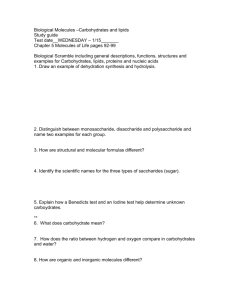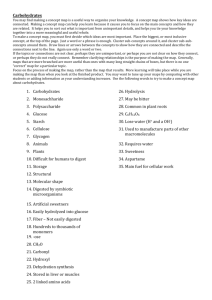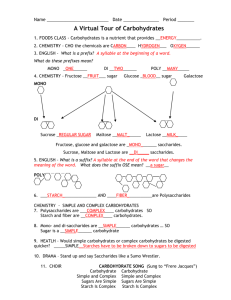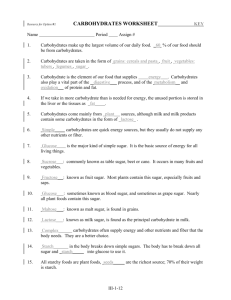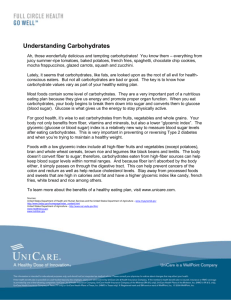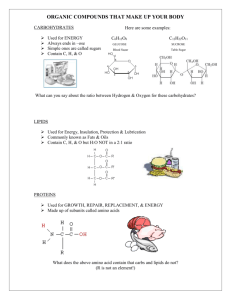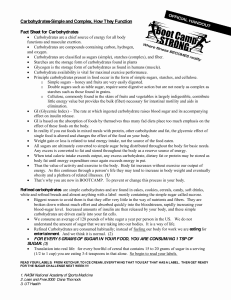What Foods Contain Carbohydrates?
advertisement
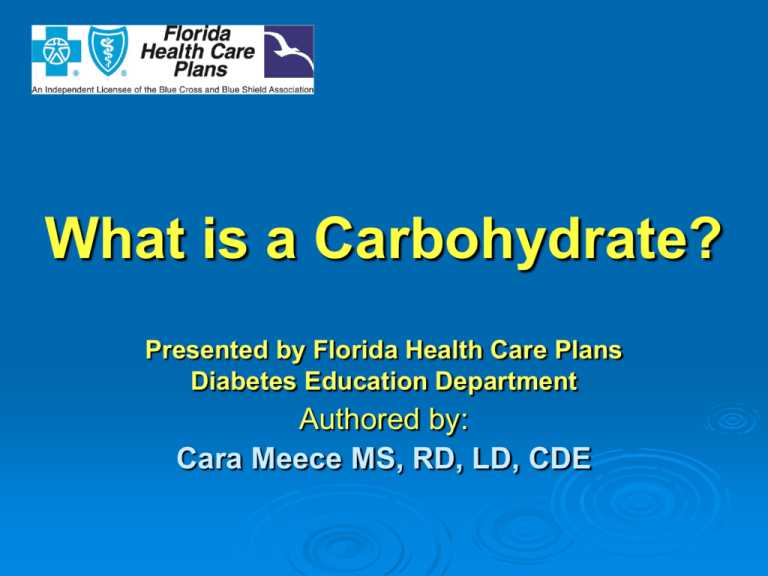
What is a Carbohydrate? Presented by Florida Health Care Plans Diabetes Education Department Authored by: Cara Meece MS, RD, LD, CDE In this presentation you will learn: Nutrients defined Carbohydrates defined What foods contain carbohydrates? Why do I need to know what foods have carbohydrates? Carbohydrates and blood sugar control Specifics for you Summary Nutrients Defined What are nutrients? “A chemical that an organism needs to live and grow or a substance used in an organism's metabolism which must be taken in from its environment.” They enrich the body. (http://en.wikipedia.org/wiki/Nutrient) The macronutrients (Nutrients needed in relatively large quantities) include: protein fat carbohydrate Nutrients Defined (cont.) The macronutrients (Nutrients needed in relatively large quantities) include: Protein Fat Carbohydrate What the major nutrients we eat do Protein Used to build enzymes, tissues, hormones, other body chemicals and to repair tissue. (http://www.webmd.com/fitness-exercise/guide/benefits-protein) Fat Provides us with insulation and stored energy They also help with inflammation control, blood clotting, and brain development. (http://www.nlm.nih.gov/medlineplus/ency/article/002468.htm) Carbohydrates Our main energy source Part of the framework for DNA and RNA’s structure Found in cell walls of plants (http://en.wikipedia.org/wiki/Carbohydrate) Carbohydrates Defined Carbohydrates contain many nutrients our body’s need- vitamins, minerals, and fiber Foods that contain carbohydrate break down in the digestive system into glucose. Glucose in the body is? The simplest form of carbohydrates. What the body uses for energy. Why do I need to know what foods have Carbohydrates? When I have diabetes the foods I eat breakdown differently than normal Foods break down into carbohydrates, proteins, and fat The carbohydrates break down into glucose Glucose enters the bloodstream Glucose can not get from the bloodstream into the cell as normal = raised blood sugar levels (hyperglycemia) Blood Sugar Levels and Carbohydrate Intake What happens if I eat too few carbohydrates? I may have hypoglycemia (low blood sugars) What if I have too many carbohydrates at a meal? I may have hyperglycemia (high blood sugars) What Foods Contain Carbohydrates? Starches/Grains- (bread, cereal, pasta, rice crackers, tortillas), legumes, and starchy vegetables (corn, peas, potatoes) Fruit- fruit, fruit juices, canned and dried fruit Milk- milk and yogurt Sweets- desserts, sodas, candy, syrup, honey, jams, and sugar Carbohydrates and Blood Sugar Control Foods that contain carbohydrates give us energy, however some meals tend to have large amount of carbohydrates. To many carbohydrates at one meal = ? Hyperglycemia Carbohydrates and Blood Sugar Control Example: Mary Before lunch • Blood sugar = 87 • Food = ham sandwich with a small apple. Before Dinner • Blood sugar = 108 • Food = 2 cups mashed potatoes, carrots and 2 slices bread • Blood sugar before bed- 203 What could have caused the high blood sugar? The high amount of carbohydrates at dinner. Carbohydrates and Blood Sugar Control (continued) The portion size or combination of foods I eat can effect my blood sugar levels. If I have diabetes and eat large amounts of high carbohydrate containing foods, what may happen to my blood sugar? It will rise. What if I don’t eat enough carbohydrates at a meal? My blood sugar may drop to low. Summary By knowing what foods have carbohydrates and portioning them, I can help improve my blood sugar control. Carbohydrates break down differently in my body when I have diabetes vs. when I do not. The 3 major nutrients we eat are protein, fat, and carbohydrate. Nutrients are required for human survival and they enrich our body. Specific Recommendations for You To find out how many carbohydrates you need a day… Call our Health Education Department at 386-676-7133 or 1-877-229-4518 For more information on diabetes, it is recommended that you attend our 10-hour American Diabetes Association (ADA) recognized Diabetes selfmanagement classes. You will receive an individualized meal plan. Other Recommendations If you have been to our classes and want to see a Registered Dietitian for a more individualized approach… please call the Member/Health Education Department 386-676-7133 or 1-877-229-4518
